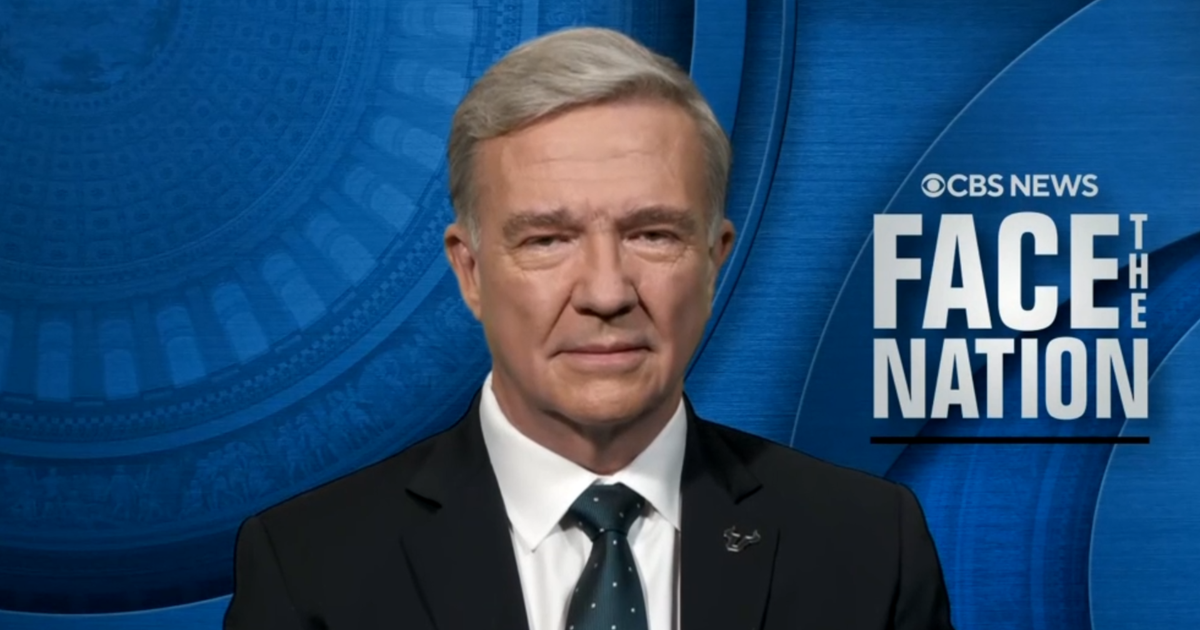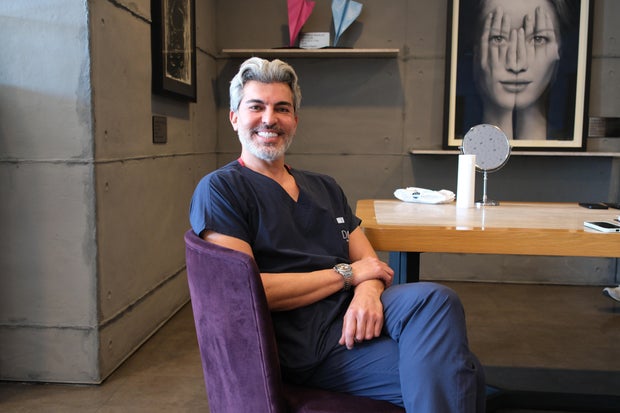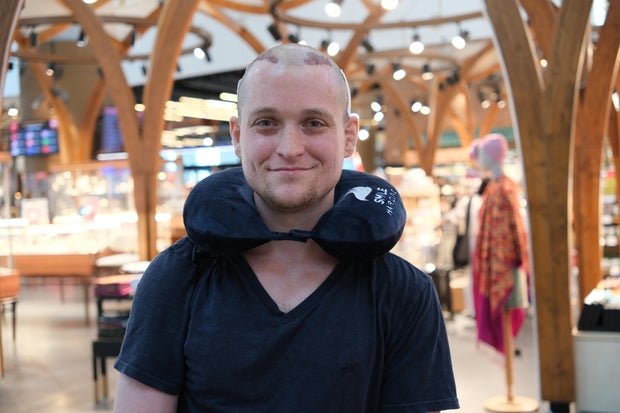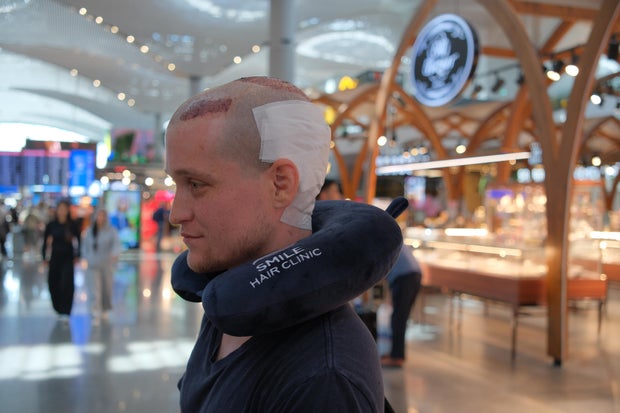CBS News
Thinking of a hair transplant? Here’s where many Americans are heading.

Gaze around Istanbul Airport and you are almost certain to spot a male traveler with a shaved head and a bandaged, bloody scalp. Some travel in groups or pairs, while others are alone. But they’ve all trekked to Turkey in pursuit of one thing: hair.
Many Americans and medical tourists from other countries are today flocking to Istanbul, which has gained a reputation as a premier destination for hair transplantation and restoration. Generally, the process involves implanting healthy hair follicles into a patient’s scalp in bald areas and along a desired hairline, resulting in natural-looking results over time.
Turkey offers procedures that are also widely available in the U.S., but for a fraction of the price, according to patients who elected to undergo the surgery abroad. Many patients also attest to the high quality of care available in Turkey, including the deep bench of doctors experienced in this type of cosmetic operation.
The doctors, not surprisingly, agree.
“In this world, when someone does something better, people go there,” Dr. Serkan Aygin, an Istanbul-based hair transplant doctor, told CBS MoneyWatch. “We have a number of very good, very serious clinics in Turkey with deep backgrounds in hair transplantation.”
Megan Cerullo / CBS News
“Here for the price”
Aaron Collins, 30, traveled from Chicago to Turkey in August for an appointment at Smile Hair Clinic, an Istanbul-based clinic led by two hair transplant surgeons — both members of the International Society of Hair Restoration Surgery (ISHRS) — which is certified to treat international patients.
Turkey isn’t the only country to welcome medical tourists on a budget seeking a variety of cosmetic procedures. And sometimes the results can be disastrous. More than 90 U.S. citizens died after traveling to the Dominican Republic for cosmetic surgery between 2009 and 2022, according to the Centers for Disease Control and Prevention.
Megan Cerullo / CBS News
Collins chose Smile after researching hair restoration surgery online. His procedure, which cost $6,000, involved implanting 4,100 follicular unit grafts pulled from the back of his head to his scalp. Although he found lower-priced treatment, Collins said he wanted the entire procedure to be performed by, or under the supervision of, a licensed doctor.
“I really came here for the price. In Turkey, it’s probably one-third of what it costs in the U.S. — it can maybe get down to one-fifth. And I have heard that depending on where you go, the quality of the procedure itself is pretty equivalent,” he told CBS MoneyWatch.
Megan Cerullo / CBS News
Collins said technicians working under a surgeon’s supervision extracted follicles from the back of his head, called the donor area, and inserted them along his desired hairline. The surgeon performed all the incision work and determined the hairline — something he paid extra for but that he believes was worth the added cost.
“It’s crazy enough to travel to another country,” he said.
Medical tourism boom
Collins is one of many Americans who have traveled thousands of miles for a cosmetic procedure for a fraction of what a top-notch version of the same procedure would cost in the U.S. In 2023, more than 1.5 million tourists visited Turkey for medical procedures, spending roughly $3 billion, according to a state-owned health care company established by the country’s Ministry of Health to promote medical tourism.
In the U.S., a hair transplant costs an average of $7,500, according to the Foundation for Hair Restoration, a Miami-based hair transplant center. In Turkey, a typical hair transplant costs between $1,800 and $4,500, according to Istanbeautiful, an online guide to medical tourism.
To be sure, wherever a hair transplant is done, the cost will vary based on the number of grafts required in a procedure as well as a given doctor’s experience and reputation. By another measure, in 2021 the average cost of the procedure in the U.S. was $13,610, compared to $2,676 in Turkey, according to Statista. In markets like New York and Los Angeles, the price tag tends to be even higher, and can rise to $25,000.
Aygin said that of the roughly 20 hair transplants he performs on patients daily, as many as eight are from the U.S. But he treats patients from around the globe.
Recent hair transplant recipient Iyad Alieh, 28, said he recently traveled from Luxembourg to Aygin’s clinic at the recommendation of a friend. His procedure involved taking 5,000 grafts from his chest to restore his hairline. It cost him roughly $3,300, Alieh said.
Aygin’s clinic confirmed that it charges patients a flat fee of 3,000 euros (roughly $3,300) no matter how many grafts are required. Aygin said the equivalent procedure in the U.S., performed by a doctor with comparable experience, would cost $25,000.
“It’s cheaper and better,” Alieh said, comparing his experience to that of a friend who had had similar work done in the United Kingdom at a cost of £12,000 ($15,300).
Beware the black market
Turkey, as well as other countries, also have black-market clinics offering hair transplants. But physicians and organizations all warn patients to be leery of services offered at bargain-basement prices.
“It’s like letting a medical assistant do a breast implant or face lift versus a doctors,” Ricardo Mejia, vice president of ISHRS told CBS MoneyWatch. “It’s the same principal — the doctor is not to delegate surgical responsibilities to unlicensed medical assistants.”
He’s aware of a growing number of doctors who have taught technicians the follicular united extraction (FUE) hair transplantation technique. “They think if they have the technicians do it, it makes the doctor extra income. That has exploded into what we call the black market of non-doctors doing the surgery,” Mejia said.
Dr. Ozlem Bicer, an ISHRS member who operates a hair transplant clinic in Istanbul, advises patients to avoid unlicensed clinics not only because they can produce bad results, but because it is dangerous for patients to be given anesthesia without the supervision of a doctor.
“If the doctors preform the surgery, the price has no chance to be low. Patients should know that low cost means black market,” she said.
Bicer said she regularly treats patients who underwent surgeries at black market clinics, and whose donor areas, like the backs of their heads, became completely depleted or whose hairlines weren’t properly aligned. Corrections can end up costing twice or three times as much as the initial procedure, she said.
Bicer said the first questions medical tourists should ask about a hair transplant doctor or clinic are: “Who performs the surgery? Do they have a license?” Not, “How much does the procedure cost?”
CBS News
Transcript: Ret. Gen. Frank McKenzie on “Face the Nation with Margaret Brennan,” Oct. 6, 2024

The following is a transcript of an interview with retired Gen. Frank McKenzie, former commander of U.S. forces in the Middle East, on “Face the Nation with Margaret Brennan” that aired on Oct. 6, 2024.
MARGARET BRENNAN: To discuss the ongoing conflict in the Middle East, we go now to retired General Frank McKenzie, who was the former commander of US forces in the Middle East. It’s good to have you back with us, General, we saw–
GENERAL FRANK MCKENZIE: Good to be with you, Margaret.
MARGARET BRENNAN: We saw the US and Israel say there would be severe consequences for what Iran did with those 180 missiles fired at Israel, President Biden said he doesn’t support an Israeli strike on Iran’s nuclear facilities, and he’d be thinking instead about alternative targets to oil fields. What do you expect the US to do, and what do you expect to happen in the next few days?
GEN. MCKENZIE: Well, Margaret, let’s begin by saying Iran is the country that’s in a corner. Their strike against Israel several nights ago was not particularly successful. Their principal ally in the region, Hezbollah has been decapitated, and its own offensive capability is gravely limited. Hezbollah’s is gravely limited. So Iran’s on their back heel. Israel has a lot of choices here. They can choose for something that would be very escalatory in terms of a strike against the Supreme Leader himself, perhaps, or against the nuclear program, or against the oil infrastructure, or they could look at military intelligence targets. They have a wide variety of options that they can choose from. They have the capability to execute most of those attacks, I will say this, the nuclear target is a very difficult target. It’s large and complex. I held the plans for that when I was a central command commander. I’m very familiar with it. There are a lot of other alternatives to that target that perhaps you could go after first, then hold out in case you get into an escalatory ladder with the Iranians. But the Israelis are certainly going to hit back, and I predict it will be larger than the very restrained, very modulated response that we saw in April after the first large Iranian attack on Israel.
MARGARET BRENNAN: You heard the Republican Chair of the House Intelligence Committee not advocate for an attack on nuclear facilities, but say it shouldn’t be taken off the table. It’s been widely reported for some time, General that it’s only the United States who could effectively take out the underground facilities that Iran has. Does that remain the case?
GEN. MCKENZIE: Well, let me begin by saying you should never take a potential target off the menu. You want your adversary to have to plan to defend everything. So giving-giving them assistance and not knowing and not-not having to defend against a particular target is probably not the best way to establish this kind of deterrence. Having said that, the Iranian nuclear target is a very difficult target, we have special capabilities that allow us to get at it. The Israelis do not have all of those capabilities. They can certainly hurt this target if they choose to, if they choose to strike it. But again, because of its size, complexity and scope and how it’s expanded over the last 10 years, it’s a very difficult target to take out. It would be very resource intensive, and I would just, I would argue, just from a purely military point of view, there are perhaps targets that are more productive to hit in an initial response.
MARGARET BRENNAN: Do you want to give us some options?
GEN. MCKENZIE: Well, again, you know, we talked about some of them. I think oil infrastructure is certainly a possibility. And the oil infrastructure can be very broad. You can look at refineries, you can look at storage facilities, you can look at locations where the oil is unloaded onto ships. So within the oil target, it’s not monolithic. You can- you can be escalatory or less escalatory, as you look at targets there. That might be something to take a look at, but I’ll tell you the other thing, Margaret, is the Iranians made a big show of targeting the Mossad headquarters in urban Tel Aviv. Israel certainly has the capability to go after IRGC, Islamic Republican Guard Corps headquarters and intelligence buildings all around Tehran or anywhere else. Again, as we know from April, Israel has the ability to operate not with impunity, but with great force over Iran at a time and place of their choosing. And I’m sure they’re thinking about all those options right now.
MARGARET BRENNAN: There’s also that risk of unintended consequences, since you’ve characterized Iran as cornered here, are you at all concerned that this could be the kind of event that would trigger them to actually pursue a nuclear weapon? They’ve given themselves options, but they’ve never fully pursued it in the way that US intelligence has said the supreme leader would have to make the ultimate decision to do. Could this be the trigger event?
GEN. MCKENZIE: Margaret, it’s always been my belief that the Iranians flirt with breakout, with getting fissile material to create a bomb in order to extract concessions from us, because we dance, we’re very eager to come to an agreement with them on the nuclear issue, so they know they can get stuff from us. They also know if they cross that line, you can’t go back. That’s a Rubicon that can’t be recrossed. But even if they, even if they do develop the fissile material, which they can do, within a matter of days or weeks, they still have a delivery problem. They’ve got to create a missile and an entry system that will allow it to take the missile to Tel Aviv or whatever target they choose. That’s a matter of many months, and that’s the valley of death for Iran, because during that period of time, they will have declared nuclear, and they will be vulnerable. It’s not a physics problem, then it’s an aeronautical engineering problem, and the aeronautical engineering systems in Iran are going to be vulnerable to attack. So it’s not as easy as you might think for them to just declare, you know, we’re going nuclear, or to go nuclear. They’ve got to balance a number of things as they do that.
MARGARET BRENNAN: Important context. If I can ask you, sir, former President Trump, as you know, faces an ongoing assassination threat as revenge for ordering the killing of Qassim Soleimani, that Iranian general. You played a key role in that, and I know you face threats as well. Mr. Trump recently said, big threats on my life by Iran. The entire US military is watching and waiting. The Biden White House has condemned the threats, but some Republicans say it’s not loud enough. How do you think this should be messaged? Do you think Iran is getting the message not to go through with this?
GEN. MCKENZIE: So whenever we look at Iran, we need to look at what’s their basic motivation. The principal goal of Iranian statecraft is regime preservation. They view the election of President Trump as a direct threat to that regime preservation. So I have no doubt believing that Iran is very active in its attempts to go after the former president, as well as other officials, of which I am keenly, personally interested as well. But I think that-that’s what’s driving their behavior. Is desperation. Margaret, it’s actually the same sort of desperation that drove the massive attack on Israel of three or four nights ago. They’re in a corner and they really don’t have any good options, but they don’t want to sit still and do nothing. They view President Trump as worse than the alternative that could be elected.
MARGARET BRENNAN: General, thank you for your analysis.
CBS News
Transcript: Sen. Mark Kelly on “Face the Nation with Margaret Brennan,” Oct. 6, 2024

The following is a transcript of an interview with Sen. Mark Kelly, Democrat of Arizona, on “Face the Nation with Margaret Brennan” that aired on Oct. 6, 2024.
MARGARET BRENNAN: Joining us now is Arizona’s Democratic Senator, Mark Kelly. He’s in Detroit this morning on the campaign trail for the Harris campaign. Good morning to you, Senator.
SEN. MARK KELLY: Good morning, Margaret.
MARGARET BRENNAN: I want to talk to you about Arizona, but let’s start in Michigan, which is where you are right now. And it is going to be such a key state to a potential Harris or Trump victory. Vice President Harris is facing challenges among black men, working class people, as well as the Muslim and Arab populations skeptical of the White House support for Israel’s wars. What are you hearing on the ground there from voters?
SEN. KELLY: Well, my wife, Gabby Giffords, and I have been out here for a couple days. We’ve been campaigning across the country, Michigan, I’ve been in North Carolina, Georgia as well. I’ll be back to Arizona here soon. The vice president was out here speaking to Muslim organizations and the Arab community about what is at stake in this election and addressing the concerns that they have. What we’re hearing, issues about the economy, about gun violence, about, you know, supporting American families and the difference between Donald Trump and Kamala Harris. You know, Kamala Harris, who has a vision for the future of this country, Donald Trump, who just wants to drag us backwards.
MARGARET BRENNAN: Today in Dearborn, Michigan, there’s a funeral service for an American man who was killed in Lebanon by an Israeli airstrike. It just underscores how that community you’re talking about out in Michigan feel some of what’s happening in a personal way to their community. Given how close this race is, do you think this war and the expectation it could escalate could cost Democrats both a seat in the Senate and potentially the presidency?
SEN. KELLY: Margaret, nobody wants to see escalation and it’s tragic when any innocent person, whether it’s an American or Palestinian, lose their life in a conflict. Tomorrow’s one year since October 7th, when Israel was violently attacked. Israel has a right to defend itself, not only from Hamas, but from Hezbollah and from the Iranians. But, you know, I and my wife, you know, we feel for the community here who’s been affected by this. And that’s why the vice president was out here earlier, a few days ago, meeting with that community.
MARGARET BRENNAN: But it’s a live issue.
SEN. KELLY: Yeah, sure. I mean, there is an ongoing conflict in the Middle East. Israel is, you know, fighting a war now on, I think it’s fair to say, two fronts and then being attacked by the Iranians as well. And, they- they need to defend themselves, and we need to support our Israeli ally. At the same time, when women and children lose their life, innocent people in a conflict, it is- it is tragic.
MARGARET BRENNAN: You do sit on the Senate Intelligence Committee and so I know you know how intense the efforts are by foreign actors to try to manipulate voters going into November. Just this Friday, Matthew Olsen, the lead on election threats at the Department of Justice, told CBS the Russians are, quote, highlighting immigration as a wedge issue. That is such a key issue in Arizona. Are you seeing targeted information operations really focusing in on Arizonans right now?
SEN. KELLY: Not only in Arizona, in other battleground states. It’s the Russians, the Chinese, the Iranians, and it’s significant. And we need to do a better job getting the message out to the American people that there is a huge amount of misinformation. If you’re looking at stuff on Twitter, on TikTok, on Facebook, on Instagram, and it’s political in nature, and you may- might think that that person responding to that political article or who made that meme up is an American. It could be- it could look like a U.S. service member. There is a very reasonable chance I would put it in the 20 to 30% range, that the content you are seeing, the comments you are seeing, are coming from one of those three countries: Russia, Iran, China. We had a hearing recently, with the FBI director, the DNI, and the head of the National Security Agency. And we talked about this. And we talked about getting the word out. And it’s up to us, so thank you for asking me the question, because it’s up to us, the people who serve in Congress and the White House to get the information out there, that there is a tremendous amount of misinformation in this election, and it’s not going to stop on November 5th.
MARGARET BRENNAN: Understood. And we will do our best to help parse that for viewers. But on the topic of the border, President Biden did announce just this past week new regulations to keep in place that partial asylum ban that he rolled out back in June. That’s what’s credited with helping to bring down some of the border crossing numbers in recent weeks. It was supposed to be a temporary policy, dependent on how many people were crossing at a time. Do you think this is the right long term policy, or is this just a gimmick to bring down numbers ahead of the election?
SEN. KELLY: Well, the right long term policy is to do this through legislation. And we were a day or two away from doing that, passing strong border security legislation supported by the vice president, negotiated by the vice president, and the president and his Department of Homeland Security, with Democrats and Republicans–
MARGARET BRENNAN: But this is not legislation.
SEN. KELLY: –This is bipartisan. This isn’t. But the legislation was killed by Donald Trump. We were really close to getting it passed. That’s the correct way to do this. When you can’t do that, Margaret, when a former president interrupts the legislative process the way he did, which is the most hypocritical thing I’ve ever seen in my three and a half years in the Senate. After that happened, the only other option is executive actions. And this has gone from what was chaos and a crisis at our southern border to somewhat manageable. And if you’re the border- Border Patrol, you know, this is this- you need this. I mean, otherwise it is unsafe for Border Patrol agents, for CBP officers, for migrants, for communities in southern Arizona. So it’s unfortunate that this was the- these were the steps that had to be taken.
MARGARET BRENNAN: Okay.
SEN. KELLY: But that’s because the former president didn’t allow us to do this through legislation.
MARGARET BRENNAN: Senator, we have to leave it right there. Face the Nation will be right back.
CBS News
10/6: Sunday Morning – CBS News

Watch CBS News
Be the first to know
Get browser notifications for breaking news, live events, and exclusive reporting.





